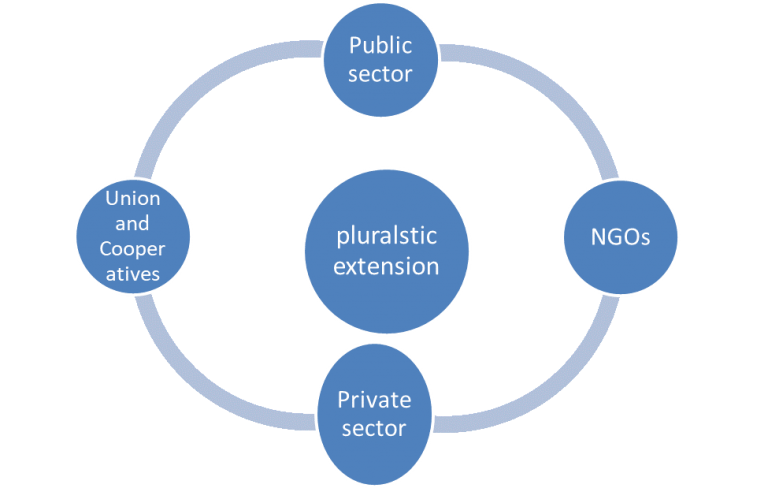Introduction
A growing variety of public and private rural extension advisory services are available in different countries today which leads to Pluralistic Agricultural Extension Services, where advisory services are provided by different actors and funded from different sources. This is generally regarded as an important step forward, away from reliance on monolithic, mostly state-led Agricultural Extension Services.
Pluralistic Agricultural Extension Services have the potential to overcome constraints related to funding, staffing and expertise, and to make advisory services more demand-driven. However, the question of are they able to reach the hundreds of millions of small-scale farmers in need of services? Remains a challenge. Reality seems to indicate that too many farmers still fall through the cracks between service providers and remain inadequate services. The inclusive aspect of Pluralistic Agricultural Extension Service thus warrants closer attention.
The importance of Pluralistic Agricultural Extension and Advisory Service Policy in Ethiopia
Agricultural Extension and Advisory Service provides educational, consulting, coaching, mentoring, organizing and coordination services using various extension methods and approaches to bring knowledge, attitudes and behavioral change to different users. The Government of Ethiopia (GoE) has been deploying 69,625 (17,096 women) Kebele extension workers, established 14,065 Farmer and pastoral Training Centers (FTC/PTC), 20 agricultural technical and vocational training colleges nationwide over the past years to deliver quality agricultural extension and advisory services at grass root level. These services have played a significant role in introducing and benefiting various technologies and inputs to the value chain actors including the smallholder farmers and pastoralists.
The predominant channel of the extension services provision is through farmer/pastoralist training centers. Hence, in this regard, the grassroots level extension workers, agricultural technical and vocational training colleges, and modernizing the extension infrastructures are heavily done through the government’s investment. As a result, the existing extension service could not satisfy the growing demand of services by clients. Therefore, providing effective agricultural extension services through wide range of actors is paramount important.
Even though the current National Extension Strategy aims to enhance client oriented and multi actor’s extension and advisory services, facilitate market linkage and enhance value chains development and enhance institutional arrangements, coordination and linkages among key agricultural development partners but lack of Agricultural Extension and Advisory Service policy, legal and institutional framework pluralistic agricultural extension and advisory services provision has not yet been in place.
To address the limitations of efficiency and effectiveness of the agricultural extension and advisory services and to contribute for the rural development programs of Ethiopia, a comprehensive and inclusive Pluralistic agricultural extension and advisory services policy is very crucial. Hence, the GoE is in the process of revising its agricultural and rural development policy in general and the agricultural extension and advisory services in particular towards pluralistic agricultural extension and advisory services.

